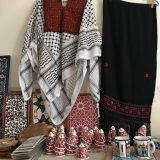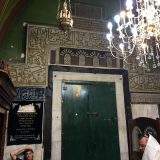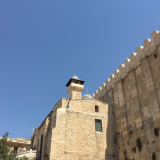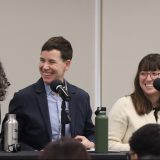
Education Through Experience: Seeing Beyond the Divide
September 28, 2017
By Muhammad Karkoutli, ‘(20)
Political Science Major
A mosque and a synagogue standing side by side, commemorating the same prophet, yet divided in bitter conflict. One
could not distinguish between the sincerity in the reverence for tradition in either holy site. The mannerisms, etiquette, and atmosphere were almost identical in the Cave of the Patriarchs located in Hebron, one of the major flashpoints of the Israeli-Palestinian conflict. Gilded calligraphy decorated the walls and columns were fashioned out of grand marble. The air was filled with a cool sense of serenity. To gain entrance to the site was anything but serene. The dull security checkpoint paled in comparison to the grandeur of the ancient site. It was indeed out of place however it subconsciously reminded one that they were in a conflict zone and not merely witnessing the tomb of Prophet Abraham, the patriarch of Judaism, Christianity and Islam. Known to Jews as the Tomb of the Patriarchs and to Muslims as the Ibrahimi Mosque, this historical site is important to both faiths. One could not help but be overwhelmed by a lingering sense of glumness when faced with the tragic reality. However, the kindness shown by the custodians of both sites kindled the same feelings of warmth.
Just adjacent to the Cave of the Patriarchs is the old city of Hebron where a labyrinth of stone covered alleyways is the home to an ancient bazaar. What was once a bustling economy of tourism and trade had become a ghost town in which the religion of an individual dictated which streets one could walk down. Faced with both conflict and the restriction of movement in certain areas, the inhabitants of the old city of Hebron have had to deal with their family businesses virtually ruined due to restricted mobility throughout the city. Hebron is a hub for Palestinian commerce and trade and is split into two districts known as H1 and H2. H1 is much larger and is under the control of the Palestinian Authority while H2 is administered by Israel through several checkpoints, barricades, and military patrols. The situation is quite bleak as communication between the two groups, Palestinians and Israelis, is strained by years of fear, mistrust, and violence. If there is no form of meaningful communication, how will any solution be made? How can the next generations be expected to find the answer to the current political impasse given their grave circumstances? Where does one even begin?
This past summer, I along with four other Chapman students and two professors participated in the Olive Tree Initiative’s
(OTI) trip to the Middle East as Chapman’s inaugural cohort. OTI started at UC Irvine over ten years ago and is a university-based organization that has chapters throughout California and the United Kingdom. Likewise, OTI seeks to promote conflict analysis in the form of experiential education centered on informed discourse. What I experienced on this journey, particularly in the city of Hebron, located in the West Bank, has changed my perception of the importance of applied education. To be clear, what I mean by applied education is the utilization of knowledge learned in the classroom setting and being able to apply it to the world around us in a useful manner.
Before my journey, my conception of what education meant was at best intangible. There was no relevant use of knowledge learned in the classroom, which was applicable to my daily life. The value of letter grades had little to no impact on me. What I was searching for was knowledge that could be of some use, knowledge that I could implement into my life and ultimately knowledge that could incentivize me to think. On the OTI trip to the Middle East, all I could do was think. What use was any sort of political commentary if I could not think or articulate what I was experiencing right in front of me? One of the merits of OTI’s model for education is that it forces one to utilize knowledge from the classroom realm and to apply it to the real world through the medium of reflective thought.
To answer the question previously put forth, one begins on the path to find an answer through education and the application of the knowledge learned. Albeit, some may be skeptical about the importance of education, as I once was, but it is the application of knowledge that is crucial for dealing with any conflict in life. Without any salient application of knowledge; knowledge becomes of little use. The situation that I witnessed in Hebron has forced me to think about the conflict as not some distant event described in a textbook, but as a conflict that is actually affecting people’s’ reality. Such a shift in thinking has caused me to apply the education that I am receiving through postulating questions and bringing historical information to life. The usefulness of applied education is that it has caused me to
listen, understand, and communicate with perspectives that were once foreign to me. Likewise, without communication, hope for a better future becomes an ideal that is quite unattainable. And without hope, one is regulated to the whims of chaos, confusion, and fear- the triad that inevitably leads to conflict and denies any meaningful answer to be formed.
OTI can equip the Chapman community with the tools necessary to engage in meaningful dialogue as well as enable students to study and witness conflicts first hand. The benefit of witnessing conflicts has in my experience caused me to grow and be more conscious of the world around me. The first step to any answer is education through experience. By visiting Hebron, my thought process has transformed through the raw experience of witnessing the similarities of two traditions who hold the same site of the same prophet so dearly, yet are infinitely divided.
- Merchandise from a local Hebron business.
- Inside the Tomb of the Patriarchs.
- Ibrahimi Mosque minaret.









